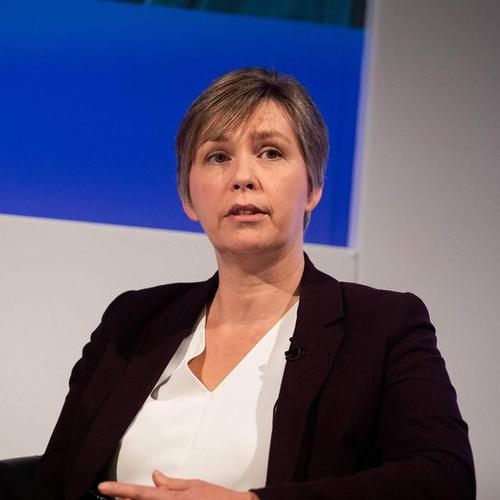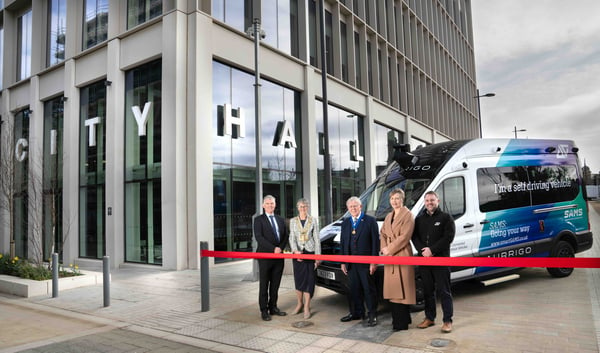The trends and ideas shaping smart cities - part one
The concept of smart cities continues to evolve - driven by technological advancements, changing community needs and a growing awareness of the need for sustainable development.
As a new year kicks off, here's some of the key ideas and trends shaping smart cities in 2024 and beyond.
A shift in smart-city thinking: Theo Blackwell, Chief Digital Officer for London
“I’ve seen a huge increase in the confidence of local governments in experimenting with Internet of Things (IoT),” says Theo Blackwell, Chief Digital Officer for London. “There is a greater sense of comfort and experience by staff in non-data roles who understand how smart city technology can be implemented into their work.” Mobility, urban transport and climate change mitigation – these places will continue to be “hot bed” for problem solving using data and smart technology, he adds
A good example in London has been the use of AI and smart cameras to detect fly-tipping – the illegal dumping of waste – allowing local borough's to identify illegal perpetrators. “Because the data was of such a high quality, it has allowed them to enforce against it quite quickly,” Blackwell says. Similar IoT pilots have been used to understand, monitor and reduce damp in homes and mitigate the risk of flooding.
detect fly-tipping – the illegal dumping of waste – allowing local borough's to identify illegal perpetrators. “Because the data was of such a high quality, it has allowed them to enforce against it quite quickly,” Blackwell says. Similar IoT pilots have been used to understand, monitor and reduce damp in homes and mitigate the risk of flooding.
Underpinning the success of these use-cases, Blackwell argues, is the application of the principles of digital transformation and design-thinking onto the smart cities space. The vendor-led mindset from previous years has been replaced. Instead, councils are using data to understand a problem area more deeply, then going and procuring the right technology. This mindset change, Blackwell says, is “driving forward the smart cities of today.”
The definition of a smart city is also shifting. Original smart city-thinking was to buy a platform imagining a “Hunger Games-esque view of your city,” Blackwell explains; now it’s about having “consistently designed use cases in operation at the same time” – rather than aggregated into one place. “It is much more about how you link data from various owners in a city and craft bespoke data services.”
Against this backdrop, Blackwell and his team are creating a new data library, which builds on the existing London Datastore, and is where critically enabling data for the city is stored. “By creating this big network, we’re able to reduce friction in how data is shared between all 32 London Boroughs, universities and organisations. We can also begin to create guidelines on what good data services should look like, and ultimately lay the foundations for greater AI adoption.”
Citizen empowerment - Stevie McGowan, Design Lead at Glasgow City Council
The Centre for Civic Innovation (CCI) is a citizen-centred design team within Glasgow City Council, responsible for engaging with citizens to co-design and build their city together with local government. Stevie McGowan, Design Lead at CCI, says this is key to ensuring Glasgow’s future city ambitions and innovations deliver real social value.
“We’ve found that what citizens want to see doesn’t always match with the priorities of local councils,” he says. “Like most cities, Glasgow is made up of  different areas – all with slightly nuanced needs and demands. The design process, the tools and the technology used to address these specific challenges need to be focused on people’s lived experiences.”
different areas – all with slightly nuanced needs and demands. The design process, the tools and the technology used to address these specific challenges need to be focused on people’s lived experiences.”
CCI has co-designed a model for participation, which the council have used to work out how to spend money locally and how to tackle priority areas like recycling, poverty and wellbeing. This has involved looking at how different citizens might be more meaningfully involved – and what enables their participation. “A lot of people don’t want to talk to local councils - we’ve had to find ways to build trust, enable diversity of thought and improve engagement with underrepresented groups - whether it’s online or in-person sessions, or even visual storytelling”
The team recently created a QR code to improve engagement with young people and to ask them questions about what they want to see in their community.
Accessibility and collaboration - Richard Shakespeare, Chief Executive of Dublin City Council
One of the biggest focuses for Dublin City Council this year is to encourage more collaboration between Dublin and other EU cities, said Richard Shakespeare, Chief Executive of Dublin City Council.
This follows the recent news that Dublin has been awarded the 2024 European Capital of Smart Tourism. “Our Smart Tourism programme, which was established in 2019, has been sharing, collaborating, and learning from some of the best cities in Europe and embedding this best practice in our own work through our new Tourism Strategy 2023-2023,” Shakespeare said.
and embedding this best practice in our own work through our new Tourism Strategy 2023-2023,” Shakespeare said.
The programme involves facilitating events, engagements, and activities all focused on best practices in sustainable tourism. According to Shakespeare, representatives from other tourism destinations in Europe will visit Dublin during the year to collaborate, learn, and share ideas."
In the spirit of collaboration, Dublin Council has also pledged by 2028 to put universal accessibility and inclusivity at the centre of its smart city innovations. It has also set a vision to become the world's first autism friendly city by 2026.
Dublin Airport, for example, is taking the lead in creating an inclusive travel experience; this includes flyer wristbands that enable self-identification of passengers needing extra support and a sensory room that blocks out noise to better cater to those with special needs.
Digital tools to make greener cities - Dr Robin McArthur, Chair of the Joe’s Blooms Advisory Board
Building cities that are fit for the future means promoting greener infrastructure that can mitigate the effects of climate change. New digital tools that allow local planning authorities to do that will play a growing role in creating a smarter, greener – more livable – city.
“Biodiversity Net Gain (BNG) is an important milestone for local governments' role in placemaking, with the potential to transform nature recovery in England for the better,” says Robin McArthur, Chair of the Joe’s Blooms Advisory Board – a company that is helping local planning authorities to improve natural habitats.
recovery in England for the better,” says Robin McArthur, Chair of the Joe’s Blooms Advisory Board – a company that is helping local planning authorities to improve natural habitats.
“Although many LPAs are already implementing BNG on a voluntary basis, the new requirements coming into play in early 2024 will mean all authorities across England will play a central role in placemaking and conservation. With one in three (68%) people backing the policy, there are a range of digital tools like Joe’s Blooms available to support LPAs to implement BNG to its fullest.”
For the first time, new developments will result in the reappearance of nature in communities and local planning authorities will play a critical role in securing a 10% uplift in biodiversity as part of the planning process, he said. “Communities will see wildlife enriched with more green space, improving residents’ health and well-being, and boosting long-term income opportunities through green investments.”






